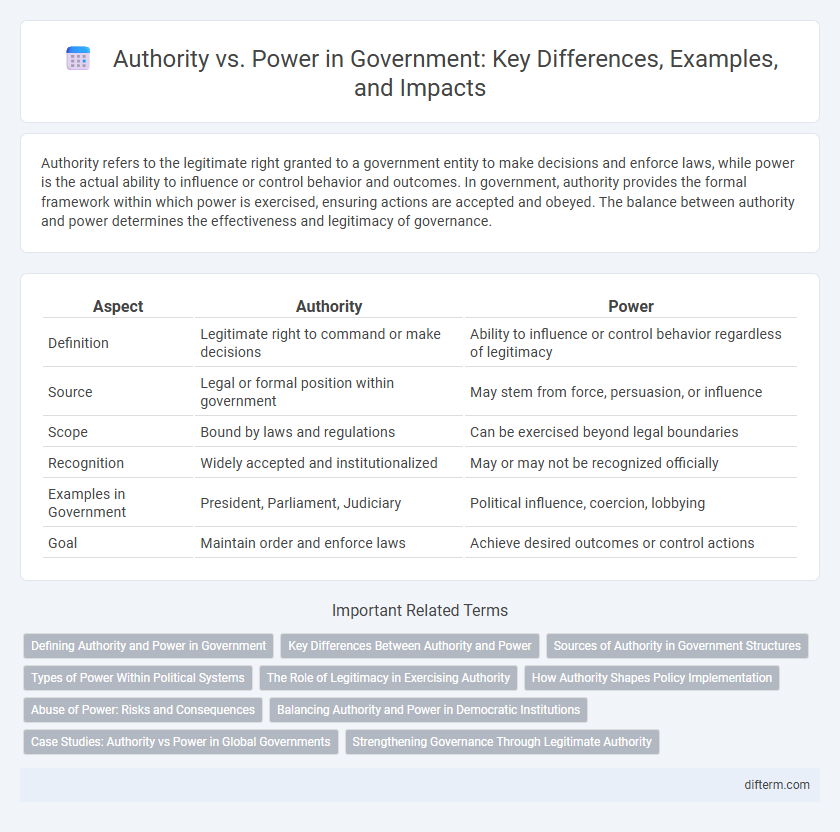Authority refers to the legitimate right granted to a government entity to make decisions and enforce laws, while power is the actual ability to influence or control behavior and outcomes. In government, authority provides the formal framework within which power is exercised, ensuring actions are accepted and obeyed. The balance between authority and power determines the effectiveness and legitimacy of governance.
Table of Comparison
| Aspect | Authority | Power |
|---|---|---|
| Definition | Legitimate right to command or make decisions | Ability to influence or control behavior regardless of legitimacy |
| Source | Legal or formal position within government | May stem from force, persuasion, or influence |
| Scope | Bound by laws and regulations | Can be exercised beyond legal boundaries |
| Recognition | Widely accepted and institutionalized | May or may not be recognized officially |
| Examples in Government | President, Parliament, Judiciary | Political influence, coercion, lobbying |
| Goal | Maintain order and enforce laws | Achieve desired outcomes or control actions |
Defining Authority and Power in Government
Authority in government refers to the legitimate right granted to officials and institutions to make decisions, enforce laws, and command obedience based on legal or institutional frameworks. Power is the actual ability to influence or control the behavior of individuals and groups, often exercised through coercion, persuasion, or political influence regardless of formal legitimacy. Understanding the distinction between authority and power is crucial for analyzing governance structures and political dynamics within states.
Key Differences Between Authority and Power
Authority represents the legitimate right granted by an institution or legal framework to make decisions, enforce rules, and command obedience, while power refers to the actual ability or capacity to influence behaviors and outcomes, regardless of legitimacy. Authority is often formal, structured, and confined within a hierarchy, whereas power can be informal and exercised without official sanction. The key difference lies in authority's basis in recognized legitimacy and rules, contrasted with power's basis in control, influence, or coercion.
Sources of Authority in Government Structures
Sources of authority in government structures primarily stem from constitutions, laws, and formal mandates that legitimize the exercise of power. Institutional frameworks such as legislatures, executive offices, and judicial bodies derive authority through codified rules and public consent, distinguishing legitimate governance from mere power assertion. Traditional, legal-rational, and charismatic authorities form the theoretical foundations explaining how governments justify and maintain their control over societal functions.
Types of Power Within Political Systems
Types of power within political systems include legitimate power, derived from established laws and authority recognized by society; coercive power, based on the ability to enforce compliance through threats or punishment; and expert power, rooted in specialized knowledge or skills valuable to governance. Charismatic power arises from a leader's personal appeal and influence over followers, while referent power is connected to the respect and admiration held by constituents. Understanding these distinctions is essential for analyzing how governments maintain control and implement policies effectively.
The Role of Legitimacy in Exercising Authority
Legitimacy serves as the foundational basis for exercising authority within a governmental context, ensuring compliance and acceptance by the populace. Authority derived from legitimate sources facilitates effective governance by aligning power with established legal frameworks and societal norms. Without legitimacy, power risks being perceived as coercive, undermining the stability and effectiveness of governmental institutions.
How Authority Shapes Policy Implementation
Authority enables government officials to enforce laws and regulations, ensuring policy implementation aligns with legislative intent. It establishes legitimate command that compels compliance from public agencies and citizens, facilitating efficient governance. The exercise of authority stabilizes administrative processes, translating policy frameworks into measurable outcomes.
Abuse of Power: Risks and Consequences
Abuse of power occurs when government officials exploit their authority for personal gain or to oppress citizens, undermining democratic institutions and the rule of law. Such misconduct leads to erosion of public trust, increased corruption, and social unrest, weakening the legitimacy of governing bodies. Safeguarding against abuse requires transparent accountability mechanisms, independent oversight agencies, and enforcement of legal frameworks to ensure ethical exercise of power.
Balancing Authority and Power in Democratic Institutions
Democratic institutions maintain stability by carefully balancing authority--the legitimate right to make decisions--and power--the ability to enforce those decisions. Effective governance depends on distributing authority across branches while limiting power concentration to prevent abuse and uphold transparency. Ensuring checks and balances enables accountability and fosters citizen trust within democratic frameworks.
Case Studies: Authority vs Power in Global Governments
Case studies in global governments reveal that authority, defined as the legitimate right to exercise control, often contrasts with power, which is the actual ability to enforce decisions. For example, in authoritarian regimes such as China, the Communist Party holds both authority and power, enabling centralized decision-making, whereas in democratic nations like the United States, authority is constitutionally distributed but power can fluctuate due to political dynamics and institutional checks. This distinction impacts governance effectiveness, legitimacy, and public compliance across different political systems.
Strengthening Governance Through Legitimate Authority
Legitimate authority fosters trust and compliance within public institutions, enhancing the effectiveness of governance frameworks. Strengthening governance relies on the recognition of authority through transparent laws, accountability mechanisms, and ethical leadership. Empowering officials with legitimate authority reduces abuse of power and promotes sustainable policy implementation.
Authority vs Power Infographic

 difterm.com
difterm.com